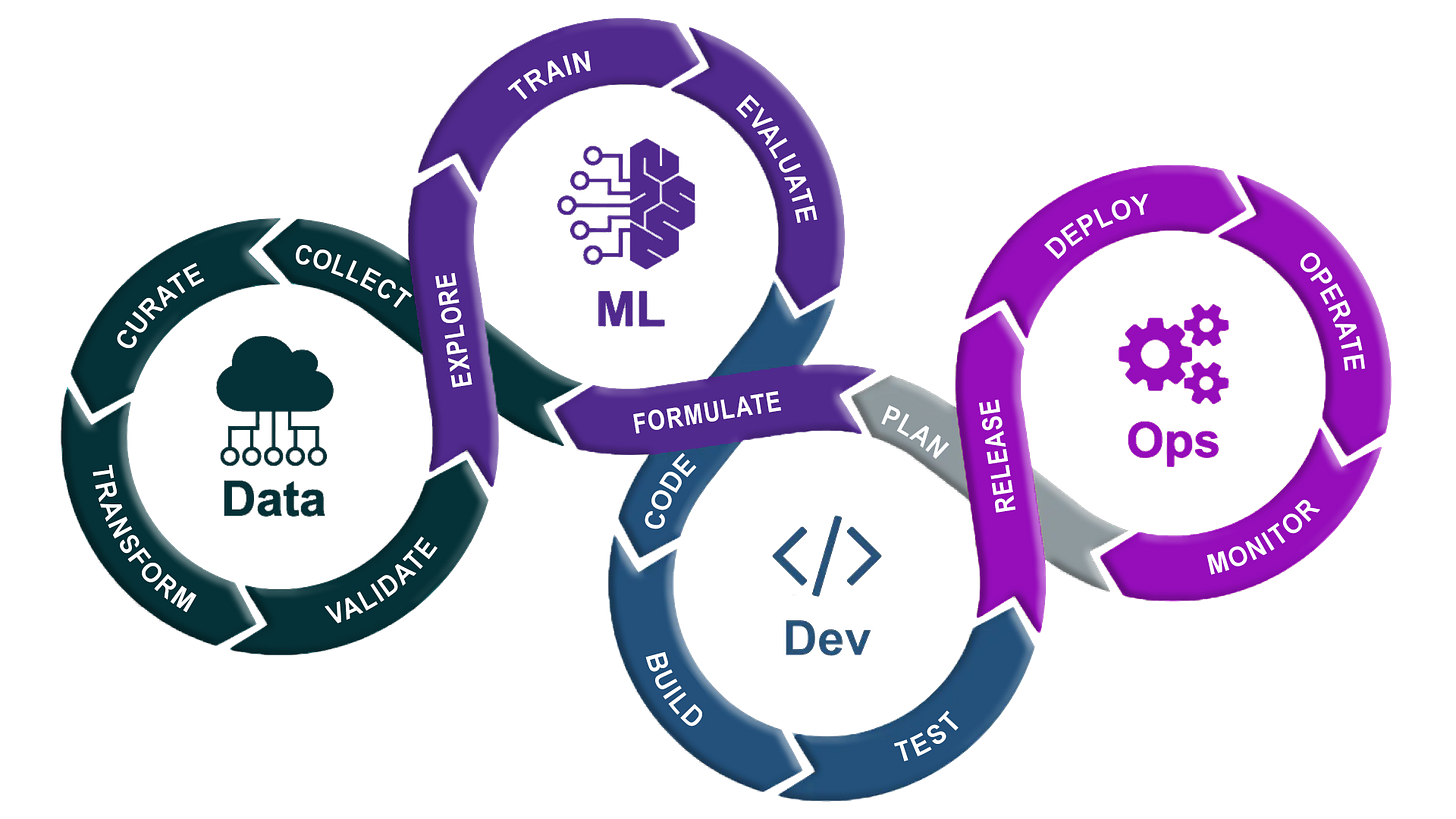AI Engineering will become ubiquitous
Not yet another AI newsletter, just the topic of the day "AI Engineering" and why everyone should have a look, at least.
Love it or hate it, but AI Engineering will be everywhere.
But the danger is that “AI Engineering” will become a term like DevOps, meaning everything and nothing.
A term where we have included every part of an AI lifecycle, and still, everyone understands something different.
Whatever the way will be, we (all, from IT to Business, from hospitals to logistics) should work on ourselves and our capabilities, leveraging AI. AI is inevitable. On the other hand, I would like to call for more realism. Call you to think twice, or maybe even more often than that, before starting to run into the rabbit hole of AI.
As the latest paper from Apple shows, AI is not there yet that it can “think”. It is very good at mimicking the process of thinking, or as it is called, reasoning. And, yes!, it is often good enough for many of the paper jobs we have to do. Sprinkling some more context, tools and information on top and it can also do way more complex tasks.
I honestly think it just shows with which stupid and useless time-consuming bull horns… we waste our time. People are still afraid of AI taking their jobs. Yet, spending 30 hours a week in meetings, I wouldn’t consider it work. Sorry, corporate live…
But for all physical workers, I see that AI comes with a huge relief. For the same reason why “knowledge” worker… Sorry I just need to laugh about that wording… are afraid of it: taking away the paperwork that no one needs.
Enough of the socio-technical aspects, let’s go into the topic.
Every role needs to find its own way to include AI Engineering
The way how and where we use AI can’t be more different. Some industries and jobs are not affected yet at all. Others are running full headfirst into it, without a single second of reflection.
Prompt Engineering - the minimum effort to get started
I don’t see prompt engineering as a future job or a crazy profession. It might be an interim functionality as long as people didn’t wrap their heads around it. I see prompt engineering similar to professional communication training in a real-life setting.
To interact and get results of an LLM as you want to have it, means you have to learn to talk to it in the right way. (Unfortunately, in most companies, comms training is coming short, too)
For the more techy people among you, Anthropic has a nice interactive tutorial on Prompt Engineering. It’s a year old, but still absolutely relevant. You can find it on GitHub. If you'd like to start a little bit less hacky, there are many good Prompt Engineering starting points: Anthropic, Google, Andrew Ng DeepLearning.ai, and if you want to go 1000% into prompting, learnprompting.org.
The message should be clear.
Everyone should learn and understand the basics of a good prompt. Maybe even forget about the engineering in Prompt Engineering.
As we “googled” the last decades, we now “prompting” it. And you should learn how to do that in the right way.
Do I have to change my IT Engineering profession?
To be honest, who knows? But this doesn’t mean you shouldn’t learn how to include AI in your work (at least prompting), and even better, how your job serves the integration of AI for the company you are working for.
If you are in Software Development
Learn how to integrate LLMs into your software products, which features and functions do the different provider give you through their APIs? How can you turn your software API into an endpoint for an AI via MCP?
MCP, introduced by Anthropic, stands for Model Context Protocol.
You should stay informed and in an frequent exchange with your product and application manager, to discuss what’s possible and what make sense. Don’t let disillusionment cause false hopes. There are enough managers, CxOs, and whatnot out there who are very good at repeating settled business/AI language; usually lacking the understanding of what can be done. Become the voice for that.
If you are in Platform Engineering or DevOps
You should learn the lifecycle of models, AI products and how to best support those developments. This includes observability capabilities that need to be adjusted for AI, new Security approaches, and most importantly, new scaling and scheduling approaches.
I like to differentiate here between AI-enabling and AI-enhancing.
AI-enhancing means you need to learn how to advance existing systems and development flows with AI. Those can be from code generation, review support, documentation to supporting onboarding processes and answering questions on documentations and git repositories.
AI-enabling means providing infrastructure, platforms, and environments that help to provide, train, and run AIs in all their flavors. (A hint, a one-platform-fits-all will not be an option). As a Platform Engineer, I like to think about how we can bring developers and AI researchers closer together? How can we use our decade of experience in automation to automate the AI foundation? And how can we enable people to serve themselves with the tools and access to infrastructure that they need?
I call the solution to this an AiDP (where IDP stands for Internal Development Platform), the AI part you will be able to guess in this name play. Others, like Pini Reznik, call it AI-native. In the end, it moves the two disciplines together. I don’t want to say merge, that might be false, but create a beneficial relationship between both disciplines. Data, ML, can utilize pattern from Dev and Ops, become way more effective.
Looking into the tech stacks of providers for such dedicated AI-enabling platforms like Crusoe, we can see in their high-level description how deeply they utilize Kubernetes and all cloud native elements around it.
As Cloud Engineer
I’m honestly not sure what the best way is here. Learning the different approaches to serving infrastructure and services for AI is for sure the way to go. However, I also feel that the role of “the cloud engineer” will become a commodity for every other role. This is because cloud providers have become “just” yet another service provider that facades tons of default services. What I mean by that is that system components are meanwhile look everywhere the same; whether it is on premise, in the cloud, on Kubernetes or somewhere else virtualized. Also, the applied logic in between is almost the same. What I mean by that is that the cloud itself is not the challenge nor the problem; it is mature enough to be boring.
I think, what we will see are two things:
A new generation of “cloud” providers, focusing on serving AI, like Crusoe
A split point of traditional cloud providers, serving in one domain, traditional computing capacities, and providing new dedicated services, not like it is at the moment, but with a full-blown AI platform service
The Infrastructure Engineers
I believe in this time, this job is the real deal. No joke.
Many new initiatives are being launched to build extremely large AI-focused data centers. The tech stacks are focusing on providing the best and fastest access to GPUs, and you're gonna work with all that hot stuff. But I think delving upwards to Kubernetes and then back down to how to provide cloud native GPU integrations is where even more fun is waiting.
But please throw away that legacy virtualization trash.
No one needs this anymore.
Which AI Engineer will you become?
So far, we just talked about the groundwork, and we haven’t even touched models, RAGing, agents, etc. For the most part, I would leave it like this and would recommend you check out sources like SwirlAI from Aurimas. In his latest newsletter, “Breaking into AI Engineering in 2025,” he gives you a nice, clear roadmap.
In the end, how you and where you will let AI take place in your career is up to you. And again, the topic might seem annoying, and almost impossible to keep up with the speed at which it develops, applying it to your niche and profile will make you go with the times. AI reminds me a little bit of Thanos…
More sources
With the focus on our cloud native environments you can find some dedicated talks around serving AI on KubeCon, Cloud Native Days/Summits and KCD.
Understanding Platform Engineering → Platform Engineering Day EU 2025
I found an interesting source: the channel of AI Engineer, which are recordings from the same-named conference. If you guys ever read this, can we bring your event to Europe too?
Tell me about your journey
Where are you currently in your engineering journey?
What are other challenges you see and face?
Let me know!





Just launched by Anthropic: an AI Fluency course https://www.anthropic.com/ai-fluency